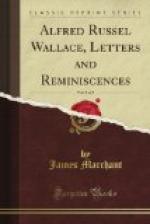I am reading through the new volume of the Life of Darwin, and am struck with the curious example his own case affords of non-heredity of acquired variations. He expresses his constant dread—one of the troubles of his life—that his children would inherit his bad health. It seems pretty clear, from what F. Darwin says in the new edition, that Darwin’s constant nervous stomach irritation was caused by his five years sea-sickness. It was thoroughly established before, and in the early years of, his marriage, and, on his own theory his children ought all to have inherited it. Have they? You know perhaps better than I do, whether any of the family show any symptoms of that particular form of illness—and if not it is a fine case!—Yours very faithfully,
ALFRED R. WALLACE.
* * * * *
Wallace was formally admitted to the Royal Society in June, 1893. The postscript of the following letter refers to his cordial reception by the Fellows.
TO PROF. MELDOLA
Parkstone, Dorset. June 10, 1893.
My dear Meldola,—As we had no time to “discourse” on Thursday, I will say a few words on the individual adaptability question. We have to deal with facts, and facts certainly show that, in many groups, there is a great amount of adaptable change produced in the individual by external conditions, and that that change is not inherited. I do not see that this places Natural Selection in any subordinate position, because this individual adaptability is evidently advantageous to many species, and may itself have been produced or increased by Natural Selection. When a species is subject to great changes of conditions, either locally or at uncertain times, it may be a decided advantage to it to become individually adapted to that change while retaining the power to revert instantly to its original form when the normal conditions return. But whenever the changed conditions are permanent, or are such that individual adaptation cannot meet the requirements, then Natural Selection rapidly brings about a permanent adaptation which is inherited. In plants these two forms of adaptation are well marked and easily tested, and we shall soon have a large body of evidence upon it. In the higher animals I imagine that individual adaptation is small in amount, as indicated by the fact that even slight varieties often breed true.
In Lepidoptera we have the two forms of colour-adaptability clearly shown. Many species are, in all their stages, permanently adapted to their environment. Others have a certain power of individual adaptation, as of the pupae to their surroundings. If this last adaptation were strictly inherited it would be positively injurious, since the progeny would thereby lose the power of individual adaptability, and thus we should have light pupae on dark surroundings, and vice versa. Each kind of adaptation has its own sphere, and it is essential that the one should be non-inheritable, the other heritable. The whole thing seems to me quite harmonious and “as it should be.”




